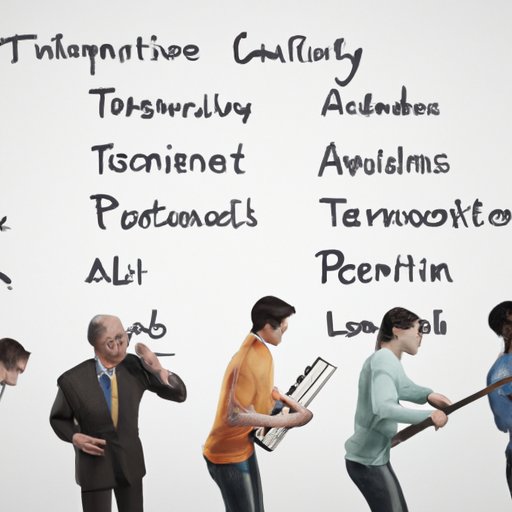Introduction
Talent is a term used to describe an individual’s natural abilities or aptitudes. It is often associated with success, as those with exceptional talent may have an easier time achieving their goals. But what exactly is talent? How does it differ from skill? And what role does it play in success? This article will explore these questions and more as it examines what talent is and how it can be developed.

Exploring What Talent Is and How It Differs from Skill
The Oxford English Dictionary defines talent as “a natural aptitude or skill for a particular task or activity.” This definition implies that talent is something that comes naturally, without the need for training or practice. In contrast, skill is defined as “the ability to do something well; expertise.” Skill implies that there has been some type of learning involved in order to become proficient at an activity.
In other words, talent is something you are born with while skill is something that is acquired through experience. For example, someone who is naturally good at math may have a talent for mathematics, while someone who has studied math extensively might have a high level of skill in the subject.
According to a study published in the journal Frontiers in Psychology, “talent is a combination of innate potential, passion for a particular activity, and the acquisition of relevant knowledge and skills.” This suggests that talent is not just about innate ability but also involves dedication and hard work.

Examining Different Types of Talent
There are many different types of talent, including cognitive, physical, and creative talents. Cognitive talents refer to an individual’s mental abilities, such as intelligence or problem-solving skills. Physical talents include athletic abilities or hand-eye coordination. Creative talents encompass artistic abilities, such as music, dance, or painting.
These talents can be further broken down into more specific categories. For example, cognitive talents can include mathematical or scientific aptitude, while physical talents can include strength, agility, or speed. Creative talents can include writing, drawing, or sculpting.
Investigating the Role of Talent in Success
Talent plays an important role in achieving success. Those with exceptional talent may have an easier time reaching their goals than those without it. For example, a talented musician may find it easier to become a professional musician than someone without any musical talent.
A 2012 study published in the journal Nature Neuroscience found that individuals who had higher levels of general intelligence were more likely to achieve success in their chosen field. The study concluded that “general intelligence may be a critical factor in determining success in life.”
There are countless examples of people who have achieved success despite having limited resources or facing numerous obstacles. However, it is clear that having exceptional talent can open doors and make it easier to reach one’s goals.
Understanding the Impact of Genetics on Talent
Genetics can play an important role in determining an individual’s talent. Certain genes have been linked to certain talents, including musical and athletic abilities. For example, a gene known as FOXP2 has been linked to language development and musical aptitude.
Genetics can also influence the development of talent. A 2017 study published in the journal Nature Communications found that genetic factors accounted for up to 60% of the variation in performance among elite athletes. This suggests that genetics can influence the development of talent, even in highly competitive fields.
Analyzing How to Develop and Cultivate Talent
Although genetics can play a role in determining talent, it is possible to develop and cultivate talent. Establishing specific goals and creating a plan to reach them can help individuals focus their efforts and maximize their potential. Training and practice can also be used to develop talent and hone skills.
For example, a musician may set a goal of mastering a certain piece of music and then create a practice plan to achieve it. Similarly, an athlete may set a goal to improve their running speed and then use drills and exercises to reach it.

Investigating the Relationship Between Hard Work and Talent
Despite the importance of talent, hard work is still essential for success. A concept known as flow has been used to explain the relationship between hard work and talent. Flow is a state of intense concentration and focus that allows individuals to perform at their highest level.
In other words, hard work and practice can help individuals reach their full potential. A 2014 study published in the journal Intelligence found that “humility, effort, and hard work are essential components in the development of talent.”
Conclusion
In conclusion, talent is an individual’s natural aptitude or skill for a particular activity. It can be divided into cognitive, physical, and creative talents, and genetics can play a role in determining an individual’s talent. Talent can be developed and cultivated through goal setting, training, and practice. Finally, hard work and dedication are essential for achieving success, regardless of an individual’s level of talent.
(Note: Is this article not meeting your expectations? Do you have knowledge or insights to share? Unlock new opportunities and expand your reach by joining our authors team. Click Registration to join us and share your expertise with our readers.)
